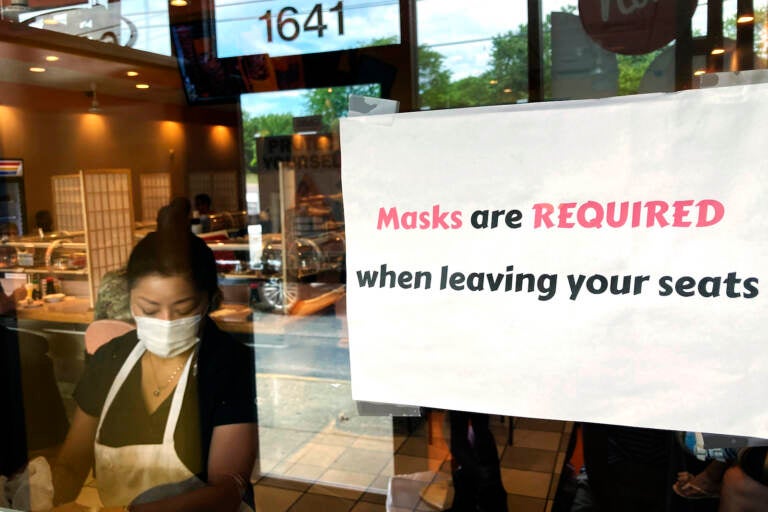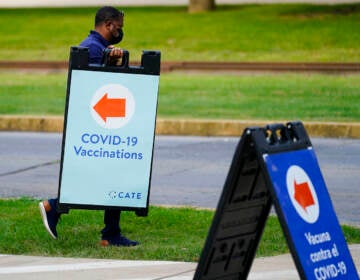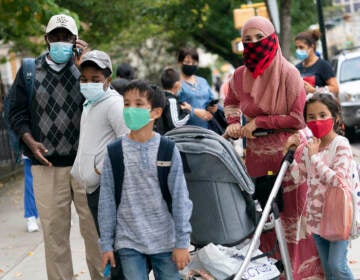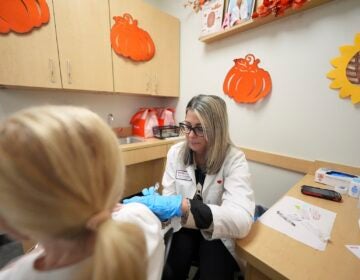Small businesses navigate ever-changing COVID-19 reality
Small business owners are left trying to strike a balance between staying safe and getting back to being fully open.

FILE - In this June 17, 2021, file photo, a sign requiring masks is displayed at a restaurant in Rolling Meadows, Ill. (AP Photo/Nam Y. Huh, File)
For a brief moment this summer, it seemed like small businesses might be getting a break from the relentless onslaught of the pandemic. More Americans, many of them vaccinated, flocked to restaurants and stores without needing to mask up or socially distance.
But then came a surge in cases due to the delta variant, a push for vaccine mandates and a reluctant return to more COVID-19 precautions. Now, small business owners are left trying to strike a balance between staying safe and getting back to being fully open.
Navigating ever-changing coronavirus reality comes with a number of risks, from financial hardship to offending customers to straining workers. Those challenges could intensify as winter approaches and outdoor alternatives become limited. Still, small business owners say the whiplash is worth it to keep customers and employees as safe as possible.
“Just weeks ago, small business owners hoped that a return to normalcy would help jump start our recovery,” said Jessica Johnson-Cope, Chair of Goldman Sachs 10,000 Small Businesses Voices National Leadership Council and owner of a small business herself, Johnson Security Bureau in New York.
New York City ordered a vaccine mandate for customers in August. For Dan Rowe, CEO of Fransmart, which runs the Brooklyn Dumpling Shop, the mandate has been a financial burden, and a headache. Brooklyn Dumpling Shop first opened in May and has six staffers. It’s pandemic-friendly format is contactless and automated.
“It was engineered to be a restaurant with less employees,” Rowe said. Glass separates the kitchen and staff from customers, who order food from an app. When the kitchen is finished making the food, it’s placed an automat-style window, so workers don’t come into contact with customers.
“We’ve engineered this great low labor restaurant, and the government is making us go backward,” he said.
Rowe had to hire another staffer to check vaccine cards at the door, increasing his overhead. His complaint is that retail stores and groceries with prepared foods like Whole Foods don’t face the same restrictions.
“It’s not fair what’s going on and it’s not practical,” he said.
The changing rules can cause customer confusion – and even some resentment. Suzanne Lucey has owned Page 158 Books bookstore in Wake Forest, N.C., for six years. When the pandemic began, the store was closed for three months. Page 158 Books reopened last July, and gradually increased store capacity from 5 to 12, abiding by state guidelines. Capacity limits were lifted ahead of the holidays last year.
When case numbers started crawling up this summer, Lucey’s zip code became the third highest in the state for COVID-19 cases. They have a sign in the window that says a mask is required inside the store, but without state or city rules to back them up, they’re not enforcing it.
Lucey said only about one or two people a month disregard the rule.
“It’s hard. You don’t want to turn people away. But I want my staff to feel secure,” Lucey said, especially since two of her staff have medical conditions that make them more vulnerable. “I don’t want my staff to feel like they have to be combative. So that’s how we’re handling it. Most people are pretty respectful.”
Allison Glasgow, director of operations for McNally Jackson bookstores in New York, echoed Lucey’s sentiment.
Her stores follow state and city rules for restrictions. One store has a cafe, which must follow the New York City mandate for customers being vaccinated. The bookstores also require vaccination proof at events. Otherwise, masks are optional, though recommended, if customers and staff are vaccinated.
“You can seem antagonistic when you’re trying to monitor people’s vaccination status,” she said. “It’s not ‘Hey, welcome in!’ which is what you have always wanted to do — it’s a bit of a roadblock there.”
Although safety is the priority for everyone, the changes can be draining for owners and staff alike. Jennifer Williams, founder and CEO of closet organization company the Saint Louis Closet Co., said the company scrambled at first to implement a COVID-19 plan, including masking and increased sanitization.
“We don’t have the option to ‘work from home,’ our business happens in our manufacturing plant and in our client’s homes, so we had to adjust quickly at the onset of the pandemic with Covid precautions,” she said.
She nixed the mask requirement July 1, after her staff was fully vaccinated, COVID-19 cases were declining and the CDC recommendations changed. But that was short-lived.
In early August, Missouri was one of the top three states of coronavirus cases. Williams re-implemented the mask mandate.
Williams’ staffers can spend up to eight hours a day in a mask installing closet organizing systems in a customer’s home. “The mental drain on employees has been extreme,” Williams said.
Jessica Benhaim, owner of Lumos Yoga & Barre, an independent fitness studio in Philadelphia, gradually increased size limits of classes from late spring into the summer, but capped them at 12, short of pre-pandemic levels of 18 students for yoga and 14 for barre.
Even though the city has lifted capacity restrictions, she’s keeping it capped in case restrictions come back. She lifted mask requirements for vaccinated students on June 15 but reinstated them when Philadelphia implemented a mask mandate in mid-August. Vaccinated students can remove their masks when they reach their mats.
“The constant adjustments over the last 18 months have been draining,” Benhaim said. “More than anything, it’s been stressful balancing making adjustments with trying to keep a sense of normalcy for my staff and clients.”

Get daily updates from WHYY News!
WHYY is your source for fact-based, in-depth journalism and information. As a nonprofit organization, we rely on financial support from readers like you. Please give today.






